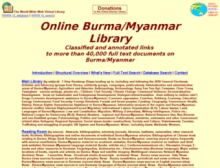Resource information
Abstract:
"In 2012, the Government of Myanmar (GoM) passed
the Farmland Law and the Vacant, Fallow, Virgin
(VFV) Land Law—creating a formalized land market. In essence, this created a formalized land
market. Land titling is often considered “the natural end point of land rights formalization” (Hall et al.
2010: 35). This thinking has become dominant among most governments and development agencies
ever since De Soto (2000) popularized it in
The Mystery of Capital
, in which he argued that the
developmental successes of the West has relied on a
strong legally-enforceable
institution of property
rights, without which assets, particularly land, would become “dead capital.”
In reality, there are at least two major obstacles in achieving this in Myanmar. The
first
is around the
legacy of multiple regimes in creating “stacked laws”
(Roquas 2002). This term refers to a situation in
which a country has multiple layers of laws that exist simultaneously, creating conflicts and
contradictions in the legal system, as well as challenges to creating a well-regulated land market
envisioned by the Myanmar state with
the passage of the two land laws. The
second
obstacle has to do
with the fact that like many countries in the world, access to legal justice in Myanmar is dependent on
one’s access to different material, social and political resources—directly to a history of patron-clientelism. Through a number of select case
studies, this paper seeks to provide preliminary
reflections on the following question: In Myanmar, a country with a porous legal framework, how do
smallholder farmers engage with the law, and where
relevant, informal norms to strengthen legitimacy
of their claims to land against confiscations?
This paper seeks to contribute to the literature on
agrarian rural movements by focusing specifically on
the way farming communities in Myanmar engage with the law, while paying attention to the
complications they face when they engage with
legal institutions that are porous and ‘stacked’—a
phenomena that is common to many countries in the early phases of rural democratization......
Keywords:
stacked laws, patron-client relationships, legal justice, legal engagemen


